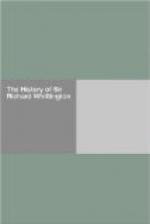Richard Whittington was the third son of Sir William Whittington, knight, of Pauntley, Gloucestershire, and it is assumed, by some writers, that he was born in or about the year 1360. We must, however, place his birth at an earlier date, for his name appears in the city Letter Book, H, fol. 110_a_, (as Richard Whyttingdone), in the second year of Richard II. (A.D. 1379), as a contributor of five marks towards a loan to the city authorities; about four-fifths of the subscribers contributing the same, which is the lowest figure among the contributions.[2] This is the first appearance of Whittington’s name in the city books. William, the eldest son, succeeded to the family property of Pauntley, but, dying without issue, the estate went to Robert, the second son, who became high sheriff of the county in 1402, and again in 1407. Pauntley remained in the family as late as 1546.
Nothing is known of Richard’s early life, either as to when or how he came to London. He appears to have married Alice, daughter of Hugh Fitzwarren, and probably he was originally apprenticed to his father-in-law, whose name appears in all the versions of his history.
The second appearance of Whittington’s name in the city books is in 8 Richard II., when he was one of the eight common councilmen for Coleman Street ward. In 11 Richard II. he is named as becoming surety to the chamberlain in the sum of ten pounds towards providing money for defence of the city. In the following year he appears to have been no longer a member for Coleman Street ward. On the 12th of March, 1393, he is named as then chosen alderman of Broad Street ward; and on 21st September of the same year he was chosen by the mayor, William Staundon, one of the sheriffs for the ensuing year.[3]
When Adam Bamme died in the year 1397, during his mayoralty, Richard II. arbitrarily put Whittington in his place, and at the lord mayor’s day of that year Whittington again filled the office, being then regularly elected.[4] From his will we find that this king, who was a member of the Mercers’ Company, to which Whittington was apprenticed, was an especial patron of his. In 1400 he was excused from attending the Scottish wars, and in 1406 he was again elected mayor. He rebuilt his parish church, and Mr. Riley has printed in his valuable Memorials (p. 578) the grant by Whittington of land or the re-building of the church of St. Michael, Paternoster, “in the street called La Riole,” called after the merchants of La Riole, a town near Bordeaux, who had established themselves there.
Whittington was knighted by Henry V., and in 1419 he was elected mayor for the fourth time. It was in this year that John Carpenter commenced the compilation of his famous Liber Albus. We see how highly this distinguished citizen was appreciated from the writings of such men as Grafton and Stow. Richard Grafton writes in his Chronicle (1569, p. 433)—




